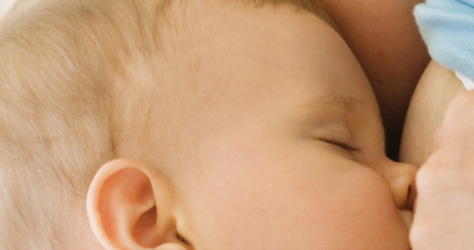Breastfeeding your baby will provide them with the best start in life...
Our midwife and breastfeeding expert Sharon Broad answers your questions on breastfeeding.
At a glance
- Finding the right position can help with any pain
- Speak to your GP, midwife or health visitor if you're struggling

Getting help with breastfeeding
Finding the right position and getting your tiny baby latched on takes practice and might drive you slightly mad to begin with. But getting it right will mean breastfeeding soon becomes a relaxing, bonding experience for you and your baby.
Breastfeeding isn’t always easy so it’s worth asking for coaching until you’ve got it right. Lots of people can help, like your GP, midwife or health visitor. Many new mums enjoy taking their baby to a breastfeeding support group and practising there. You can also try the National Breastfeeding Helpline on 0300 100 0212. When you get it right, you will be so glad you did.
Sore or cracked nipples when breastfeeding
If your nipples start cracking or bleeding, there are many ways you can help protect them:
- smear a tiny bit of white soft paraffin or purified lanolin onto any cracks (not the whole nipple) to help them heal and stop scabbing over
- after the feed, squeeze a drop or two of your milk and gently rub it into your skin
- change your breast pads at each feed (ideally avoiding pads with plastic backing)
- let your nipples dry before putting your bra back on
- avoid soap - it can dry out your skin
- wear a cotton bra - so air can freely circulate
Blocked ducts and mastitis
If you find a small, tender lump in your breast, you might have a blocked milk duct.
If you do have a blocked duct avoid wearing tight clothes or bras so your milk can flow freely from every part of your breast.
Other things that may help include:
- frequent feeding from the affected breast
- warm flannels or a warm shower to encourage the flow
- gently massaging the lump towards your nipple while your baby feeds
Catch it quickly though and you can hopefully avoid mastitis - inflammation of the breast.
There are a few key signs of mastitis:
- hot, tender boobs
- a red sore patch of skin
- you feel unwell, with flu-like symptoms
- you feel achy, tired and tearful
- a high temperature
Mastitis can get worse quickly, but the best thing is to keep breastfeeding and try a few simple changes to send it packing:
- check your baby is in the right position (yes that again!)
- feed your baby more often
- feed your baby on the tender breast first
- try expressing some milk by hand to relieve the fullness but not if your breasts are still feeling full after a feed as you will only produce more. Just taking a little off can relieve the pressure
- try warming your breast before a feed, using warm flannels or a bath or shower
- during feeds, boost milk flow by gently stroking the lumpy or tender area, moving towards your nipple with your fingertips
- get as much rest as possible – ideally crashing out in bed if you can
- take a painkiller like paracetamol or ibuprofen (at the recommended dose these are safe to take while you're breastfeeding)
If you don’t feel better within 12 to 24 hours, or you start feeling worse, contact your GP or healthcare professional who may need to give you antibiotics.
Breastfeeding and thrush
If everything was going swimmingly, then suddenly your nipples feel sore and pink, you or your baby may have thrush - a fungal infection. You can keep transferring it between the two of you, so if your baby has it in their mouth you’ll need cream for your nipples and baby needs treatment too. If you are breastfeeding it is important to get medical advice from your doctor before ever taking a thrush tablet/capsule as the active ingredient passes into breast milk so always seek medical advice from your doctor and your baby will also need treatment so make sure they are seen by your GP or health visitor too.
Breastfeeding and tongue-tie
Some babies are born with ‘tongue-tie’ , where there’s a tight piece of skin between the underside of their tongue and the floor of their mouth. It can make it very hard for your baby to feed, but luckily it’s easily treated. Just ask your midwife, health visitor or GP for advice.